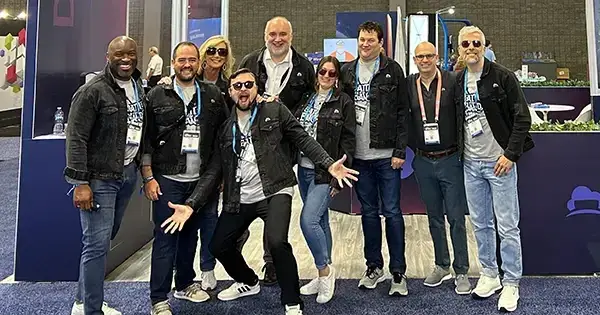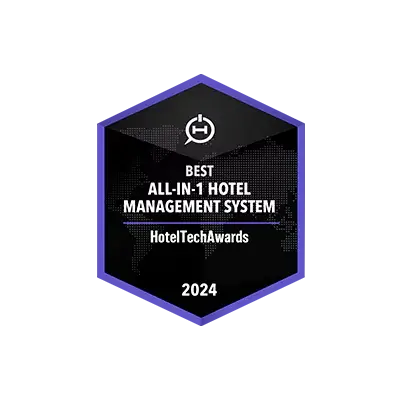Group business guide: How hotels
can attract & cater to groups in 2024
Some things are unlikely to change in hospitality. One of them is the importance of groups for hotel revenue. Groups help hotels fill occupancy and contribute to higher total revenue; however, they have become more demanding and sophisticated over the past few years and require a comprehensive strategy.
During a recent Cloudbeds Live, Hospitality Entrepreneur Russell Edmond shared some new group segments he’s been seeing lately and trends impacting hotels.
Read on to explore what group business is, why it’s vital for independent properties, and how to effectively cater to the needs of specific market segments.
Unlike individuals or families, who typically book one room, groups book several rooms for a one-off event or negotiated period of time. Some classic examples of group business include tour groups, social events like weddings or family reunions, and MICE (meetings, incentives, conferences, and exhibitions). What is group business?
Groups are important for hotel businesses since they:
- Help fill occupancy and boost revenue during low seasons
- Generate repeat business and increase revenue predictability
- Have lower acquisition costs compared to individual bookings
- Contribute to higher total revenue via food and beverage spend, AV rentals, meeting space, additional room charges, and activities
Why independent hotels must target groups
After a few years of recovery, in 2023 and continuing into 2024, group travel returned to 2019 levels. During the rebound, some interesting trends emerged:
1. Business travel is back, which means group business travel is also back
A report by the Global Business Travel Industry Association estimated a 32% growth in spending in 2023 and further growth in the upcoming years, especially thanks to small and medium-sized companies.
2. Event attendance is increasing too
However, many conferences are now leaving large urban city centers, choosing smaller cities, such as Milwaukee, WI, or Albuquerque, NM.
3. Alignment of destination with values
For events organized by professional associations, the alignment of the destination with members’ values is becoming increasingly important.
4. New destinations emerge.
Most event planners are open to US destinations they have not considered before, particularly for social and sporting events.
5. Shift to smaller groups.
For leisure travelers, there is a shift to smaller groups and more personalized, meaningful experiences, even in group itineraries.
If you are an independent hotel, these trends are great news. Even if you’re not located in a large city, you have more opportunities than ever before to do business with groups, especially in the more lucrative corporate segment.
Understanding hotel group market segments
Different group types have different needs and expectations, and also pros and cons. Here, we explore the different types of group segments and how independent hotels can cater to them.
Professional groups
Events such as annual conventions held by professional associations, trade fairs, or a combination of both can attract thousands of people. For smaller events, planners may partner with large hotel brands like Marriott, Hilton, or IHG, which feature enough rooms and event space to accommodate everything and everyone under one roof.
For events held in alternative venues like convention centers or sports complexes, planners and attendees will look for accommodations nearby that can accommodate large groups and off-site events.
What’s important to professional groups?
When looking for accommodations, the following factors are usually top priority for professional groups:
- Proximity to the event venue
- Ease of transportation
- Quality of food & beverage
- Space for off-site events
- Ease of booking and billing
How independent hotels can cater to professional groups.
Large events held in external venues can be great partnership opportunities for independent properties. Hotel sales teams can work with conference event planners to host guests and arrange appropriate transportation to and from the venue.
Hotels can also offer relevant activities and flexible spaces for travelers to use when not at the event. For example, your lobby could be a coworking space during business conferences, or you could host a networking event at your hotel bar.
Corporate groups
Like conferences, corporate events (such as meetings, incentive trips, training, or team building events) fall into the “professional” category, but with significant differences. They are smaller, so organizers are more likely to look for full-service hotels with dedicated meeting spaces.
Also, they tend to be more profitable. Corporate events have a social and leisure side, so companies are open to spending more. There is usually budget allocated towards food and beverage, team-building activities, AV rentals, and transportation, contributing to higher total revenue for hotels.
Corporate groups can also establish contracts with hotels, with predefined room allotments over a set period. In this scenario, employees of the company use a corporate code to book at a discounted rate (corporate negotiated rates) whenever they’re in town, and in return, hotels secure consistent revenue flow during the contracted period.
What’s important to corporate groups?
When looking for accommodations, the following factors are usually a top priority for corporate groups:
- Meeting space
- Quality of food & beverage
- Technology (AV equipment, fast wifi, etc.)
- On-site amenities and activities
- Proximity to corporate HQ
How independent hotels can cater to corporate groups.
Independent hotels can be a great fit for corporate groups, as they usually look for unique experiences to wow clients or treat employees. Hotel management should focus on the guest experience, ensuring the corporate groups have state-of-the-art audiovisual equipment to run meetings and options to plan activities on-site or with local vendors for non-meeting time.
Travel groups
Travel groups are the most traditional group in the hospitality industry. To work with them, it will be essential to partner with a travel agency, whether online or brick-and-mortar, to facilitate group bookings. An established relationship with travel agencies can ensure repeat business, especially during the low season.
The downside, however, is that they are more likely to negotiate for group discounts and will look for packages that include ancillary services—such as airport shuttles and guided tours—in the pricing. That might increase the hotel’s operational costs, impacting revenue management and overall profitability.
What’s important to travel groups?
When looking for accommodations, the following factors are usually a top priority for travel groups:
- Location to top attractions and transportation hubs
- Parking for buses
- Various room types to accommodate the entire group (singles, doubles, etc.)
- Efficient check-in/out processes
- Food and beverage (complimentary breakfast)
How independent hotels can cater to travel groups.
Travel groups like Intrepid, Exodus, or G Adventures like to offer travelers unique stays in the locations they visit. Independent hotels are often a great fit, providing a more local feel to the travel experience.
As an independent hotel, you must determine what type of group makes the most sense for your property. The types of travelers these groups host differ significantly—from young adventurers to family trips—so finding the right fit is crucial.
Once you’ve identified what types of groups you’d like to host, the next step is to determine what’s important to them. Regardless of group type, hotels must offer seamless check-in/out, various room types, and amenities such as breakfast and wifi.
Social groups
Like travel groups, social groups belong to the leisure category. However, they’re more likely to book rooms without the help of agencies. In the hotel industry, these groups are often known as SMERF: Social, Military, Educational, Religious, and Fraternal.
Typical examples of social group events are weddings, family reunions, annual meetings of alumi associations, hobby conferences, and religious groups. Although they are in the same category, their needs vary a lot. For example, family groups will value your offer of food, amenities, and children’s activities, while hobby and religious groups will look for a hotel with space for meetings.
What’s important to social groups?
When looking for accommodations, the following factors are usually top priority for social groups:
- Event and/or meeting space (depending on the group)
- Quality of food & beverage
- Room blocks (proximity to one another in the hotel)
- Group rates
- Ease of booking and billing
How independent hotels can cater to social groups.
Since social groups vary significantly across segments, hotel owners must define the group(s) that make the most sense to host. If you have a lovely garden or beachfront location, you might prioritize weddings. If you run a campground with cabins and space for activities, you may have the perfect spot to host a family’s yearly reunion.
Understanding your niche can help you target your marketing efforts and enhance the guest experience. Social groups want to enjoy the space they’re in and value experiences above all else.
Sports teams
Professional and semi-professional sports teams can be a lucrative hotel group for independent properties. If you have venues nearby that host sporting events at the state or national level, we encourage you to start looking into their specific needs and include them in your marketing efforts.
What’s important to sports teams?
In a research study, Cornell University surveyed 42 baseball, basketball, and American football teams with questions about their hotel needs when traveling to a competition. A few interesting insights emerged from the responses. Most teams look for hotels that:
- Are convenient to the airport and/or the stadium
- Provide single rooms with large beds for players and staff
- Provide special room rates for guests and media traveling with the team
- Have strong security to ensure the privacy of players
Other needs vary depending on the sport. For example, football players tend to eat at the hotel, and their food is provided under the strict supervision of managers and coaches, while baseball and basketball players have more freedom when it comes to dining. Football teams also need breakout spaces and audiovisual equipment for meetings and strategy sessions, while basketball players appreciate extra-large beds and late-night food service.
How independent hotels can cater to sports teams.
Hosting sports teams requires special attention from the hotel staff, which can be demanding. However, establishing a good relationship can result in repeat business that’s sustained throughout the season (and beyond).
Hotels must minimize any variables that could affect an athlete’s performance, such as noisy rooms, intrusive fans, or insufficient food and beverage. By understanding teams’ needs ahead of time, hoteliers can proactively plan for arrival, assign proper room blocks, and prepare the kitchen.
Entertainment groups
Touring bands, shows, and film and TV productions are another segment for independent hotels should consider. These groups can be short—or long-term stays; for example, production crews can work on a movie or show for months, while touring bands might be in town for the night.
What’s important to entertainment groups?
Here are a few important factors for entertainment groups:
- Close to the venue or the airport
- Parking for buses
- Early or late check-ins
- Availability of quiet rooms for bus drivers
- Amenities like coffee machines, workout equipment, laundry facilities, etc.
How independent hotels can cater to entertainment groups.
Entertainment groups are used to staying in hotels and, therefore, have high expectations. Since they’re on the go for long periods, hotels should provide as many amenities as possible to make groups feel more comfortable. Hotels must also be flexible with check-in times and provide staffing during off hours, as entertainment groups often work late into the evenings or early mornings.
Final thoughts
Travel groups are back and have brought a few promising trends with them: more personalization, stronger attention to social values and sustainability, and consideration for off-the-beaten-path destinations. All that is creating great group business opportunities for independent hoteliers. Attracting and catering to groups is no longer exclusive to hotels in tourist locations or large urban centers.
To satisfy these groups and establish profitable, long-term contracts, hotels must understand their needs and develop operational efficiencies to deliver top-tier service.

















